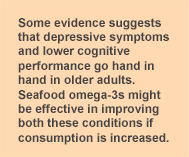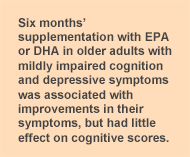
Some evidence suggests that depressive symptoms and lower cognition performance go hand in hand in older adults. A high rate of depressive episodes has been reported in patients with Alzheimer’s disease and it has been suggested that depressive symptoms may affect an individual’s perception of cognitive function. A possible link with long-chain or seafood omega-3 fatty acids (seafood omega-3s) is their association with slower rates of cognitive decline and improved learning and memory among those with mildly impaired cognition. There is also evidence that increased consumption of seafood omega-3s is associated with less severe symptoms of depressive illness. However, few studies have examined the effect of seafood omega-3 consumption in individuals with mild symptoms of both conditions.

Natalie Parletta and colleagues in Australia took on the challenge of recruiting adults older than 65 years who were able to maintain normal daily functioning, but had self-reported memory loss. In addition, the participants had to meet certain criteria on mental and verbal tests and were given an evaluation for depressive symptoms. Those who enrolled were assigned to consume daily supplements of EPA or DHA or linoleic acid (an omega-6 fatty acid) for 6 months. In addition to their mental health and cognition assessments, the participants provided a blood sample at the beginning and end of the study.

After 6 months, the participants who consumed either EPA or DHA experienced significant improvements in their depression scores compared with those consuming the linoleic acid supplement. In fact, scores in the control group worsened. Ideally, conditions are not expected to change in the control group, so this observation raises the question of whether increased linoleic acid consumption might have been detrimental. However, this study was not designed to answer that question. Overall, the 6-month supplementation with either EPA or DHA had little effect on cognitive scores. One assessment, the test of initial letter fluency, showed improvements with DHA supplementation. This study addressed a complex issue that is not easy to explore among older adults whose function is declining. Only in one measure of cognition was there an effect of DHA, but not EPA. The observation that warrants additional scrutiny is whether high intakes of linoleic acid are detrimental in individuals with depressive symptoms or mildly impaired cognition. The study provides additional evidence that higher intakes of seafood omega-3s in older adults may have multiple health benefits.
 Some evidence suggests that depressive symptoms and lower cognition performance go hand in hand in older adults. A high rate of depressive episodes has been reported in patients with Alzheimer’s disease and it has been suggested that depressive symptoms may affect an individual’s perception of cognitive function. A possible link with long-chain or seafood omega-3 fatty acids (seafood omega-3s) is their association with slower rates of cognitive decline and improved learning and memory among those with mildly impaired cognition. There is also evidence that increased consumption of seafood omega-3s is associated with less severe symptoms of depressive illness. However, few studies have examined the effect of seafood omega-3 consumption in individuals with mild symptoms of both conditions.
Some evidence suggests that depressive symptoms and lower cognition performance go hand in hand in older adults. A high rate of depressive episodes has been reported in patients with Alzheimer’s disease and it has been suggested that depressive symptoms may affect an individual’s perception of cognitive function. A possible link with long-chain or seafood omega-3 fatty acids (seafood omega-3s) is their association with slower rates of cognitive decline and improved learning and memory among those with mildly impaired cognition. There is also evidence that increased consumption of seafood omega-3s is associated with less severe symptoms of depressive illness. However, few studies have examined the effect of seafood omega-3 consumption in individuals with mild symptoms of both conditions.  Natalie Parletta and colleagues in Australia took on the challenge of recruiting adults older than 65 years who were able to maintain normal daily functioning, but had self-reported memory loss. In addition, the participants had to meet certain criteria on mental and verbal tests and were given an evaluation for depressive symptoms. Those who enrolled were assigned to consume daily supplements of EPA or DHA or linoleic acid (an omega-6 fatty acid) for 6 months. In addition to their mental health and cognition assessments, the participants provided a blood sample at the beginning and end of the study.
Natalie Parletta and colleagues in Australia took on the challenge of recruiting adults older than 65 years who were able to maintain normal daily functioning, but had self-reported memory loss. In addition, the participants had to meet certain criteria on mental and verbal tests and were given an evaluation for depressive symptoms. Those who enrolled were assigned to consume daily supplements of EPA or DHA or linoleic acid (an omega-6 fatty acid) for 6 months. In addition to their mental health and cognition assessments, the participants provided a blood sample at the beginning and end of the study.  After 6 months, the participants who consumed either EPA or DHA experienced significant improvements in their depression scores compared with those consuming the linoleic acid supplement. In fact, scores in the control group worsened. Ideally, conditions are not expected to change in the control group, so this observation raises the question of whether increased linoleic acid consumption might have been detrimental. However, this study was not designed to answer that question. Overall, the 6-month supplementation with either EPA or DHA had little effect on cognitive scores. One assessment, the test of initial letter fluency, showed improvements with DHA supplementation. This study addressed a complex issue that is not easy to explore among older adults whose function is declining. Only in one measure of cognition was there an effect of DHA, but not EPA. The observation that warrants additional scrutiny is whether high intakes of linoleic acid are detrimental in individuals with depressive symptoms or mildly impaired cognition. The study provides additional evidence that higher intakes of seafood omega-3s in older adults may have multiple health benefits.
After 6 months, the participants who consumed either EPA or DHA experienced significant improvements in their depression scores compared with those consuming the linoleic acid supplement. In fact, scores in the control group worsened. Ideally, conditions are not expected to change in the control group, so this observation raises the question of whether increased linoleic acid consumption might have been detrimental. However, this study was not designed to answer that question. Overall, the 6-month supplementation with either EPA or DHA had little effect on cognitive scores. One assessment, the test of initial letter fluency, showed improvements with DHA supplementation. This study addressed a complex issue that is not easy to explore among older adults whose function is declining. Only in one measure of cognition was there an effect of DHA, but not EPA. The observation that warrants additional scrutiny is whether high intakes of linoleic acid are detrimental in individuals with depressive symptoms or mildly impaired cognition. The study provides additional evidence that higher intakes of seafood omega-3s in older adults may have multiple health benefits.

